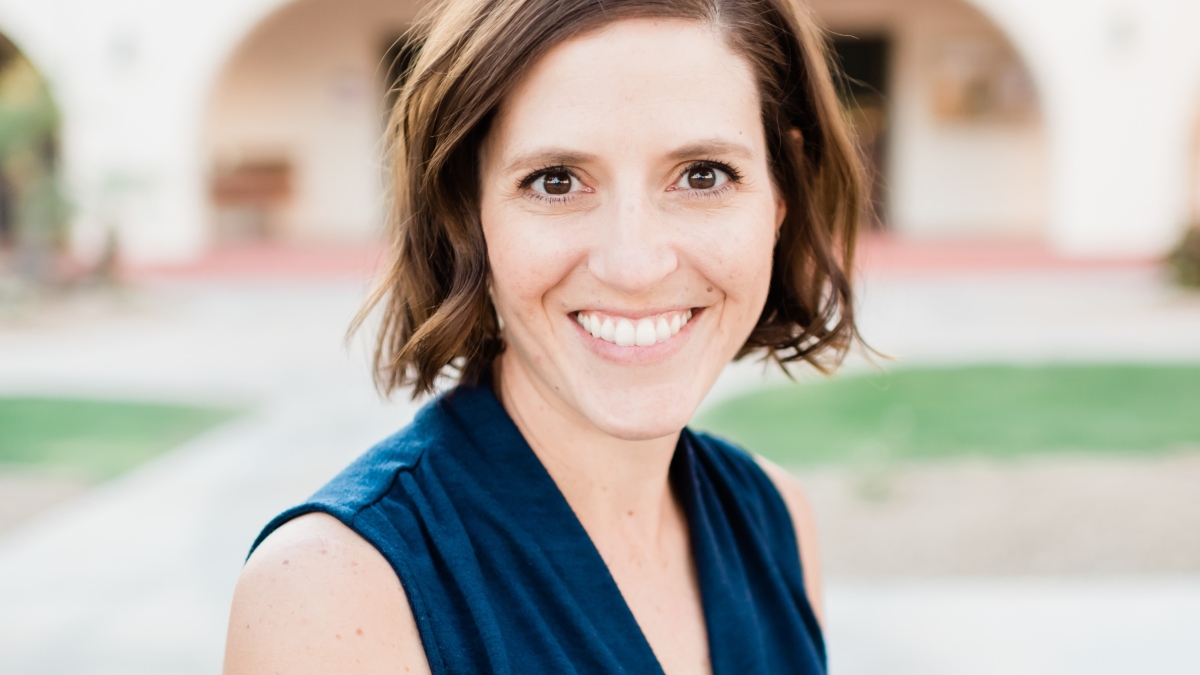Impacting Arizona education policy is grad’s focus

Megan Armstrong is graduating with a master’s degree in integrative social science in the School of Applied Sciences and Arts in the College of Integrative Sciences and Arts at ASU’s Polytechnic campus. Photo courtesy of Megan Armstrong
Editor’s note: This story is part of a series of profiles of notable fall 2023 graduates.
Arizona State University graduate Megan Armstrong’s contributions toward educational research have the potential to impact Arizona policy.
Student, mother, researcher, volunteer and societal advocate, Armstrong is graduating with a master’s degree in integrative social science in the School of Applied Sciences and Arts in the College of Integrative Sciences and Arts at ASU’s Polytechnic campus.
For her master’s thesis, she put her expertise in elementary education and her interests in education systems in society toward the goal of making a difference in Arizona schools. Her research explored the parental perspectives of a curriculum called social emotional learning, or SEL.
“Within just two weeks in my course, she chose one of the course themes as her thesis topic,” said Laverne Dacosta, an instructor in CISA’s School of Applied Sciences and Arts and nominator of Armstrong’s Outstanding Graduate honor. “Megan has undertaken a tough quantitative field-research project, which sets her apart from others who have taken a less rigorous thesis route.”
SEL, which promotes self-awareness, social awareness, self-management, relationship skills and decision making among high school students, has overwhelming parental support, according to Armstrong’s research, and she hopes policymakers will also recognize its significance.
“Social emotional learning is a thoroughly researched pedagogical concept that has the potential to make a positive difference in how people in our society relate to themselves and each other,” says Armstrong, who grew up in Vancouver, Washington.
She says the topic is being heavily discussed in Arizona and across the country, so deciding to focus her master’s thesis research in this area was an easy decision.
Armstrong plans to use her insights and skill sets to move the needle on social challenges as a high school guidance counselor or in a nonprofit or government role.
Along with parenting her four children and developing tenacious career aspirations, Armstrong plans to impact educational policy and continue her volunteer work at a local domestic violence advocacy center and Moms Demand Action for Gun Sense.
“Life is long, and there are so many opportunities,” she said. “I look forward to maximizing those opportunities to make the world a better place.”
Question: What was your “aha” moment when you realized you wanted to study the field you majored in?
A: I have varied interests. I've always been interested in people and society. I also spend a lot of time in my children's schools. When deciding what I wanted to study for graduate school, the title "integrative social sciences" felt comfortable to me. I think our entire social system is integrative, and the study of these interactions feels accurate to me.
Q: What’s something you learned while at ASU — in the classroom, lab or otherwise — that surprised you or changed your perspective?
A: I learned that research is a time-consuming endeavor that takes patience and persistence. The single aspect of my graduate degree that surprised me the most is how extensive and time-consuming the institutional review boards and research process is. You can have a thorough understanding of what you want to study and complete a process to make it happen, but it will not come to fruition until it is IRBinstitutional review board-approved and you have subjects who are willing to participate in the study.
Q: Why did you choose to attend ASU?
A: I chose ASU because of how it enables flexibility and accessibility.
Q: What’s the best piece of advice you’d give to those still in school?
A: Advocate for yourself. Always. While in the process of learning, communicating and pursuing your studies, it is your responsibility to care about your educational experience.
Q: What was your favorite spot on campus, whether for studying, meeting friends or just thinking about life?
A: I commuted from the West Valley area to the Polytechnic campus, so I was only on campus once a week. Several of my classes were via Zoom full-time or part-time. My favorite place at the Polytechnic campus is the Santa Catalina building, simply because the architecture is beautiful.
More Law, journalism and politics
Spring break trip to Hawaiʻi provides insight into Indigenous law
A group of Arizona State University law students spent a week in Hawaiʻi for spring break. And while they did take in some of the…

LA journalists and officials gather to connect and salute fire coverage
Recognition of Los Angeles-area media coverage of the region’s January wildfires was the primary message as hundreds gathered at…

A new twist on fantasy sports brought on by ASU ties
A new fantasy sports gaming app is taking traditional fantasy sports and mixing them with a strategic, territory-based twist.…

